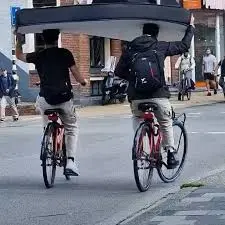apparently my city literally literally banned public rail funding, and people online love jerking off about how good biking is, so i figured might as well try. I have come up with:
pros:
- good for mental health / exercise / endorphins
- arguably quaint
- feel like an old timey guy taking his wares to market
- feel european
- can annoy others
- less of a police state around them vs cars
- more flexible parking, routes
- capacity to be peaceful
- nice in summer
cons:
- look like an annoying dork (esp w neon - which also hurts the quaint factor)
- have to wear a helmet (^)
- getting sweaty, potentially “unpresentable” for work
- still have to find safe parking
- still takes a while
- have to find new routes to places
- can’t listen to music or might die
- little meaningful protection against severe injury
- can only carry so many groceries/etc
- sucks in winter
Have a look into E-Bikes, theres a great Micromobility community on Lemmy.
My dad has one with saddlebags and says its more like owning a small motorbike. Sure he has to pedal but he never has to pedal hard. If you’re worried about looking like a dork Mercedes make ones that look cool AF.
cargo bikes are getting really practical if thats your bigger worry.
Buy a good lock and put an air tag on it though.
theres a great Micromobility community on Lemmy.
Thanks! It’s !micromobility@lemmy.world if anyone was interested btw
I like the idea of an E-bike but it just wouldnt be practical in my life at the moment. But its a pretty good community, generally stays on topic and doesnt degenerate into arguments.
Bikes are a scam perpetuated by big tire. Run at full speed for all of your travel.
Pros:
- Green (non industrial footprint)
- No bike to get stolen
- Harkons back to primitive man chasing gazelles
- Fantastic for heart health
- Just as fast as biking if you run as fast as you bike
- No need for safety equipment (raw)
Cons:
- Others will be intimidated by your presence
- May require barge poll to fend off potential suitors
Just as fast as a car if you run as fast as a car.
Con: not suitable for elderly or hanicapped people.
E-bike or custom made bike
Go to asian countries, plenty of elderly on bicycles. It is just the elderly in western countries are sedentary which leads to atrophied muscles.
With the handicapped you can make the same argument with operating a motor vehicle.
Side note: I like cars. I even have a sim rig at home to race around in. But car centric infrastructure brings more negatives than positives.
The major difference is depending on the city.
Absolutely in Tokyo and Saigon, bike riders of all ages were going about their lives. But I can’t imagine being a elderly bike rider in some US cities. Some drivers WANT to fuck with bikers. It’s disgusting.
Indeed, I should have worded my comment better. I just want to point out that it is an infrastructure issue rather than bicycles being objectively worse than cars.
Trike! Or recumbent trike. Or an e-trike.
You can say disabled, it’s not a bad word! :) there are quite a few bike options for disabled people actually. From 3 wheeled bikes to handbike/ebike hybrids. It’s awesome.
Source: I’m a wheelchair user from The Netherlands

deleted by creator
Bad faith argument. The topic of discussion is reasonable in city trips, not cross country slogs. Op is frustrated his city banned public funding for trains, ergo his question is about getting around his city. Your statement, exposure to the elements, is made more eloquently elsewhere, due to things like rain and snow.
deleted by creator
But for that you can also wear protective clothing, no?
Electric bicycles are much less tiring to use and go faster / further. Quite a game changer.
With pannier bags and a backpack you can carry quite a lot of groceries.
https://lectricebikes.com/products/xpedition-dual-battery
I have the extra large crago bags for this and I have brought home a week’s worth of food from the store up and down a mountain near where I live. It is still a bit of a struggle but pedal hard. I use it to go to work 2 miles away (I know, I’m VERY lucky) and I use it to replace driving anywhere over 10 miles away from home. The charge on the batteries last forever since I use only lvl 2-3 on pedal assist since I prefer to pedal.
There are solutions
apparently my city literally literally banned public rail funding
How to say you’re in America without saying you’re in America
Get an ebike. I wear normal clothes. Lycra is for fitting in to fitness biking groups, most don’t wear it.
I just use my ebike as a car alternative so I don’t have to fight for parking at popular spots in the city or pay for $5/gal gas unnecessarily (unless I’m actually going to a remote place, then I use my car). Gets me to my destination in roughly the same amount of time due to traffic lights and bad traffic. I’ve actually beaten friends in Ubers because the bike paths are much more direct, typically.
Recharging costs pennies, and I’m usually down to half a battery 45 miles in as long as I’m going in hybrid mode where I’m still pedaling. Gets you stupidly into shape as a side benefit, since you are always pedaling and you can turn the battery off if you want a 67lb exercise bike that also goes places.
Throw some panniers on and you can carry or tow a decent amount of stuff since the bike is electric.
I wear the same clothing when I am biking and not biking. The clothing is by no means a requirement.
If you were trying to get to work that could be problematic, especially business attire in a hot place.
I used to bike to work occasionally. It was maybe a 5 minute drive, 15 minute bike ride. I would bring a backpack with a change of clothes and change in the bathroom once I got to the office.
Back in office I remember a few people who did that, they were definitely a bit sweat smelly lmao, I live in a very warm place though, probably much more viable in a more temperate place
Rebuttals to a few of the cons:
- don’t dress like an ‘annoying dork’- unless that’s your vibe, no need to change anything to ride a bike.
- you don’t ‘have’ to wear a helmet. Though there are some less bulky, big, or wherever this cons comes from. Probably best to wear one.
- no need to go fast and work up a sweat, or e-bike as other have mentioned. There may be financial rebates available. Other commuter tips include: bring extra clothes, and wet wipes to clean up once getting to.
- until a matter transporter comes along, it takes time to go anywhere.
- you get to find new routes. Find new shops, new neighborhoods, new parks. Feel like a part of you community. Not locked in a metal box or tube.
- bone conduction headphones, or other non noise canceling headphones
- there are bikes, racks and bags in any combination that can carry all sorts of groceries.
- no bad weather, only bad gear. I’d say heat of summer is worse than winter.
no matter what gear you have you dont want to bike on snow
At 06:25 they explain that 35% of the people use special wheels with nails, so that’s different of course (they also use such rails for the winter triathlon (running (with spikes), cycling (with spike wheels), cross country skiing)).
With such wheels it for sure is safer, if someone wants to go cycling in winter that’s definitely the way to go. But if there are 20 cm of fresh snow you’ll still get stuck, you need clean roads like in the video. If the roads are clean (at 09:20 they say that the roads are clean 24h per day, max. 2 cm of snow, absolutely highest they let it go is 4 cm but that’s the exception, they also have an app that shows snow levels on each street in real time) and there’s no elevation and no sharp turns it even works with normal tires, but that’s rarely the case.
- Those are tires, not wheels.
- 35% which uses them means that 65% don’t use them.
- You said “no matter gear you have”, so you can’t use that point.
- With 20cm of fresh snow, even a normal car would be stuck. But if you tell me that you use a special car (a pick-up for example), I will argue that you can use a special bike (such as a fat bike) and roll with it without problem.
I really want to try though! Not dared to try on a road bike though…
Get spike wheels and stay on clean roads, if there’s too much fresh snow you’ll get stuck. Avoid elevation! And obviously avoid sharp turns
Or use one of these (only downhill) https://images.app.goo.gl/A1NitHgRBS3Qanza7 You can rent them in most ski resorts (at least in Austria)
Not true, winter biking really isn’t that bad and bikes are remarkably stable even on ice
That’s my experience as well. I haven’t done it much (not much snow here) but I was always surprised at how easy it was even when all the cars seemed to have a really hard time.
What kind of ice are you riding on? Snow, even packed snow it usually ok, but turning/braking on ice is a disaster without studded tires. Source - I’ve crashed on ice several times despite being a very competent rider in all conditions for 3 decades.
Nope, always wear the helmet. To not wear one is just stupid.
100%. When one of the cons is no meaningful protection against injury, a helmet should be a huge pro. It absolutely saves lives.
No it’s not. Believing the helmet is the sole saviour is stupid.
The helmet is not the sole saviour. But If I can eliminate or even highly reduce any risk, especially high risk brain injuries just by wearing a helmet, why wouldn’t you?
Seems silly to tempt fate when a helmet is so easy and mitigates a lot of risk.
I also don’t wear a helmet when i walk down the stairs of my appartment. Is that stupid and silly too, or for some reason just fine? I don’t think riding a bicycle, which you learn at three years old, is necessarily a dangerous activity.
Not if you are taking a nice leisurely ride by yourself around rolling hills and the occasional butterfly.
No I’m talking about riding a bike into town with a dozen other riders, pedestrians who dont look, dogs that’ll just wander in front of you, cars passing 1 foot too close over the line… Ya, not exactly how I learned to ride a bike. I’ll wear the helmet in the risky situation.
Makes you wonder why skydivers bother to wear a helmet at all.
Wear a helmet for whatever activity that you’d like one for, just don’t call people stupid and silly if they have different experiences and conclusions.
A helmet is only needed if you intent to spend significant time in traffic. Most of the world doesn’t use one.
The math behind using one is a lot more on the margins than people realize. In order for it to save you, it first has to prevent a head injury, and then prevent one that is in the range of severity that makes it useful. The vast majority of bike injuries won’t fall in that range, they’ll either be related to another part of the body, or in the case of high speed crashes from a car, too severe for a helmet to matter. But helmets do give people a false sense of security. Statistically people ride faster and take more risks with a helmet on. Lastly, again statistically, the visibility gear you put on yourself while riding does more to keep you safe in traffic than a helmet. Lights, reflectors, reflective vest, etc.
All this to say, the religiosity with which people proselytize helmets is misplaced. I still wear one, but I don’t judge people who choose not to.
A helmet is only needed if you intend to spend significant time in traffic.
The worst wreck I’ve ever had on a bike was without a single car in sight. Pinch flat while carrying speed through a steep downhill curve. I split an expensive MIPS helmet in two and still hit hard enough that I had a minor concussion, road rash up one side of my body, and cracked the face of a week old watch just to pour salt in the (metaphorical) wound. I mostly landed on my head and that helmet is the reason I didn’t have drastically more severe head injuries.
Helmets aren’t just for traffic.
I don’t doubt anything you are saying, but it’s worth mentioning that (iirc) 80%+ of severe injury and death on a bicycle is caused by motor vehicles, or complications of motor vehicle involvement. People very rarely have severe injury or death on dedicated bike infrastructure. The primary risk on bicycles is motor vehicles. If you remove motor vehicles, there is still risks, but someone might decide that risk is low enough to forgo a helmet. I don’t feel those people should be called stupid for their choice.
There is considerable evidence that everyone wearing a helmet in a car would save vastly more lives and prevent severe head injury, and yet pretty much no one even considers that as a normal thing to do. The bike helmet thing is therefore just as much a cultural attitude, as it is about safety.
I still use a helmet, and more importantly, visibility gear, on my bicycle in 100% of my rides. I’ve never worn a bike helmet walking or driving in a car, even though my cousin died from a head injury getting hit by a car and my grandma in law died of a head injury in a car…
There is also this interesting dutch study, where somehow helmeted cyclists were 25 times more likely to end up in a hospital. Of course the reason for that never comes up as something problematic from the side of our solely safety concerned citizens, they will congratulate you for your new speed record down that hill.
80%+ of severe injury and death on a bicycle is caused by motor vehicles, or complications of motor vehicle involvement.
Which would mean ~1 in 5 have absolutely nothing to do with a motor vehicle. That’s significant.
There is considerable evidence that everyone wearing a helmet in a car would save vastly more lives and prevent severe head injury
Then that should be an easy [citation needed] for you because my searches are coming up blank for actual studies. Lots of assertions of it, but I’m not finding anything in terms of actual data.
It’s very easy, on the other hand, to find comprehensive meta analyses on the efficacy of helmet use.
It’s also worth noting that the introduction makes a point of calling out another common online assertion that you repeated – that helmets make people engage in more risk-taking behavior – as false:
There has already been an extensive peer-reviewed literature review conducted by Esmaeilikia et al.5, which found little to no support for increased risk-taking when cyclists use helmets and if anything, they cycled with more caution.
I don’t feel those people should be called stupid for their choice.
I don’t think they’re stupid. I think they’re bad at risk analysis. That’s a pretty inherent feature of humans. It’s the reason I want to see actual data.
You make some good points.
I still wear one, but I don’t judge people who choose not to.
I don’t wear one and I judge myself for not doing so 🤷
Complicated issue.
the religiosity with which people proselytize helmets is misplaced.
It feels very much religion like, but also an online phenomenon only. IRL the helmet discussion goes like this for me: “You don’t wear a helmet?” “No.”
The topic coming up is super rare too, while on every picture of a cyclist without a helmet on the internet you got all these comments from helmet fundamentalists going nuts over it.
Personally, I have cracked open a helmet once. On a quiet country lane, with no traffic. Pot holes can catch you any time.
I don’t remember the crash, just the slide.
That is what makes me tell people to wear helmets.
And your friends don’t get annoyed?
I hope you also posted one of those wonderful “today the helmet saved my life” topics on reddit so the community could get together for their daily service.
My cycling club mandates helmets, so not a problem. Only really come up with the hire bikes in cities etc.
Nope, I was to busy being miserable about having a broken collar bone.
Broken collar bone, the classic.
Sorry if i came off rude, i am just so over people claiming that every kind of cycling is dangerous and all that can save you is a helmet.
I mentioned in another comment that there is a dutch study that finds the helmeted rider to be more than 25 times more likely to end up in a hospital. 25 times more likely. Obviously roadies and MTBers. I am absolutely not saying people should stop road or mountain biking, even that is not all that dangerous and practitioners don’t all end up dead or crippled sooner or later.
But if a person is just casually cycling without a helmet, they are doing much more for their safety than those sporty riders with helmets. Somehow this then always gets countered with “i know someone who fell on his head while stationary and is now being spoonfed by his loved ones. No, he didn’t have clips / clipless pedals”. Made up bullshit in 99.9% of cases, i have seen this in almost every helmet topic i have read.
I don’t disagree. I’ve worked on an ambulance, I’ve seen what the results of improper protection does to a person. But also how it affects everyone else involved- from the people scraping you off the street to the family that has to take care of you. The unseen injuries of head trauma. At the end of the day, it’s a personal choice- just think about the possible consequences to yourself and those around you.
Think of it this way- don’t wear a helmet because you ride a bike, wear a helmet because everyone else is in a car… they don’t look for you, they don’t care about you. Only you can care about you. It’s car culture pushing the responsibility of safety onto the cyclists to avoid culpability.
Two fairly interesting videos arguing each point and may help yall convince others to wear a helmet better than calling them stupid.
https://youtu.be/rhzH6mEpIps?si=UGH6OVQVYDOH7oLf
https://youtu.be/1JfbTwrtOWU?si=WF7RlOLg4h_uv58e
Be safe, anything can happen. Wear a helmet, even for the ‘safe’ rides so it becomes second nature.
Your time at the ambulance sounds very real and believable.
I worry the dutch society will collapse if they are all going to be brain damaged after the next turn. These fools should look how it’s done in north america with their fantastic helmet culture.
Guess dutch people are stupid, but at least they have way less death per kilometer while cycling ¯\_(ツ)_/¯
Ikr, I live in the Netherlands and not only do i not wear a helmet myself but I’ve seen dutch people ride with no hands, holding an umbrella and a phone, with bikebags full of groceries, in the rain, without a helmet.
That shit is close to a circus act, istg.
For an outsider, it was very funny to see women fully dressed for a night out, riding with an umbrella and speaking on the phone at the same time.
Could be even lower if they wore helmets though. I don’t even wear a helmet myself, but it’s objectively smart to do so.
My friend got something caught in his front wheel and went over the handlebars at 30mph. Could have been turned into a vegetable if he wasn’t wearing a helmet.
And we could save a lot of people if they put on helmets to walk down stairs, and yet I don’t see anyone saying that people are stupid not to wear them.
And your friend, if he drives at 30mph, of course he has to wear a helmet, but the subject is not a sporty practice of cycling, but bike commuting. And helmets does not protect you from a shitty infrastructure and tank-like cars that run you over, so maybe it would be good to stop insulting people and bring some nuance to this debate.
A guy in my lab in his early 50s went over and busted his neck and is now a quadriplegic. He WAS wearing a helmet.
I’m not saying don’t, I’m saying if the universe wants you, it’ll get you.
there are bikes, racks and bags in any combination that can carry all sorts of groceries.
Paper and liquid products are not cooperative with two-wheeled transportation, so there’s still a tangible limit
Where there is no will, there is no way.
If it’s a Costco monthly trip, no. On your carbon road bike, no. Full suspension downhill bike, no. Holding a 2liter bottle of Shasta Cola and three rolls of TP? Rethink some things.
If you know it’s going to be a utility bike, yea. Easily done. If it’s a zippy get about thing, consider a little trailer for the hauling trips- buy used, even the old ones roll fine.
I’ve been going for about a year, with two panniers and a front rack, for weekly groceries for a family of 3. Milk, eggs, toilet paper, no problem. Back when Mission Workshop just split off from Timbuk2 I got their expand-o Marry Poppins backpack (the rambler)which is awesome- though I wouldn’t buy it at the current price (eye watering)…it does fit A LOT, like 12kg bags of dog food and still has room. It can carry the weirdest things.
The worst part is getting the panniers up the flight of stairs to our apartment…which would be the same struggle regardless of transportation.
I have a trailer that I attach to my bike whenever I have to haul a lot of stuff. It’s very convenient. You can add a little wheel at the front to use it by hand with its handle. It carries 40 to 60 kg and is foldable to take less space if needed.
I love my bike trailer. I added an aluminium box to make it water proof and I use it almost weekly for groceries.
wow. just wow. what an american hot take. tell me the cons of fresh vegetables please.
Tastes worse than junk food. Need to chew forever to get the number of calories required to survive. No dopamine hit for eating a bite of radish. More expensive than frozen/canned alternatives.
🦅🇺🇲
Just to add, if you go with a bicycle, you do not need to forgoe cars altogether. For those days you need to haul around a bunch of items, you can rent a car through a car sharing service. You can rent them for a few hours.
Pro:
- Look this shitload of money you don’t have to pay for insurance, parking and gaz
Con:
- Look this shitload of time you’ve spent to “fix just this another thing”
I tried biking in a city awhile back, and someone actually tried to hit me with their door.
Any city that thinks its a great idea to share the road on a bike has never personally tried it.
Thats why cities should build seperated lanes so cars and bikes mingle as little as possible
If we’re talking infrastructure buildouts I’d rather just go the extra step and build a few tram/train lines vs adding a bike lane to every road
I sorta agree and sorta don’t, all streets should be 30km/h or less and shared traffic, everything else should be with bike lanes. Streets meaning a piece of infrastructure that provides access to places lining it, not a piece of infrastructure for longer distance travel.
The Netherlands is good not because there is a bike lane on every street but because all the streets with destinations (private homes, business, schools)are connected by bike lanes as well as roads, often more and more direct bike lanes.
There are a lot of areas where cars bikes and sometimes pedestrians share the same space both in inner cities and in residential neighborhoods, it’s just that they aren’t through roads for cars or at least very very slow ones, while they are often through roads for bikes and peds.
I see where you are coming from there. My comment is mostly concerned with north america and our street/road design and layout is awful. There are many school zones where cars could easily exceed 100km/h if the driver wanted to. Because of these deisgns I think it is best we keep cyclists and pedestrains as seperated from cars until better street design and traffic calming can be massively implemented. The scale of the street redesign is massive and would have to be city wide to be truly effective.
An easier and cheaper start to pitch politically would be proper bike lanes along major corridors. A few years down the line streets along those lanes would improve and the city could slowly redevelop.
I wish I could just snap my fingers and have safe streets but stroads and the attitude of driving is so bad in much of north america we are going to have to fix it in stages. We can’t just convert our stroads overnight unfortunately.
Yeah I’m in Germany so my context is somewhere in between and here the projects that improve my life the most is when cars don’t get to/need to travel on the streets as much, this can either be through modal filters, removing car lanes or just banning cars (with the usual delivery window in the morning and such). And they are starting to get to the kind of streets where you could go 100km/h (in terms of size) that are in practice 50km/h, and are now getting them down to 30 (taking 1 of 2 car lanes and giving it to bikes as well as adding obstacles to indicate slower speeds). So it’s doable and of course it takes time, but with a bit of luck it might be faster than some Americans imagine it could be.
So of course bike lanes along mayor roads (corridors) make sense, and it can be a good starting point to get a skeleton network in place, which then can Kickstart intersection redesigns and traffic calming, wherever it’s reasonable around it. To me the best bike paths don’t go along roads though, they are the “recreational” paths that still connect things. Cutting through a patch of Forrest or a park, going along the waterfront, parallel to a tramway or rail corridor or just along/through the fields. These are probably also politically cheaper than some other measures, but you run the risk of building a thing that just connects nothing because there is no real infrastructure on either end.
I feel like Americans think they are 60+ years behind when they are probably only 30-40, if the attitude turns somewhat sharply, either just in your local area or more generally, maybe just 15-25.
A lot of this stuff is monetarily very cheap, depending on how desperately you wanted change the actual infrastructure you’d need, would boil down to planters, bollards, cones, maybe hay bails or large stones/concrete pieces. The problem with that stuff is that it’s only possible with the right opportunity politically, otherwise your traffic calming might get bulldozed by police or something.
Yeah, in an ideal bubble, I would like to see trams replace cars for dense sectors that see a lot of traffic.
There are plenty of protected lanes in my city, but they just hide bicycles behind parked cars, making it less safe at every intersection.
The only way I can think that might work better would be to convert a 3-lane road (with suicide/turn lane in center), into a 2-lane road. The center lane gets converted into a two-way bicycle road - raised up like a sidewalk with curved curb. No left turns allowed for cars, only right turns. This way bicycles are visible and protected.
A better option is to make seperate intersections for cars and bikes. Bike lanes do not exclussively have to run right next to the car lanes.
I’ve done it for almost 2 decades and confirm people are assholes.
little meaningful protection against severe injury
This is why I’m an advocate for seatbelts for bicycles.

















